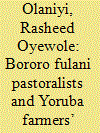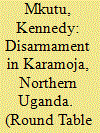|
|
|
Sort Order |
|
|
|
Items / Page
|
|
|
|
|
|
|
| Srl | Item |
| 1 |
ID:
138124


|
|
|
|
|
| Summary/Abstract |
This article, based on in-depth oral interviews, focuses on the conflicts between Bororo Fulani pastoralists and Yoruba farmers in Saki and Iseyin towns of the Upper Ogun River (Oke-Ogun), Oyo State Nigeria to show the power disparity and competition over land resources. The conflicts that occurred between Bororo Fulani pastoralists and Yoruba farmers are classified as: economic (crop destruction and cattle killing); social (murder, rape, armed banditry, molestation on both sides of the conflict); and communal (large-scale destruction of villages, pastoral settlements and markets). Other conflicts involved access to grazing and water resources and access to markets. These conflicts were products of resource scarcity and broader challenges of power relations between indigenes and settlers/migrants in Nigeria. Ethnicity became more conspicuous among local people as these conflicts intensified. This article discusses the intervention of Yoruba traditional rulers (Oba) and Fulani headman (Ardo) in the formation of peace committees in Iseyin and Saki towns.
|
|
|
|
|
|
|
|
|
|
|
|
|
|
|
|
| 2 |
ID:
080700


|
|
|
|
|
| Publication |
2008.
|
| Summary/Abstract |
Disarmament is a major feature of international, regional and national small arms and light weapons control policy and legislation worldwide. The proliferation of arms is now a significant problem amongst pastoralists in the Horn of Africa. In Karamoja, northern Uganda, where armed inter-communal and intra-communal conflict is disrupting lives and livelihoods, several attempts at mitigation have been tried. This article considers whether disarmament attempts have provided any solution to the conflicts. Empirical data collected between 2000 and 2006, consisting of interviews with combatants, local leaders and community members, government reports and media articles have been used to recount these endeavours and their consequences in the communities. The work first gives the regional and cross-border arms dynamics. It then considers the history of conflict and disarmament in Karamoja and examines in detail the recent disarmament since 2001. The successes or failures are considered in terms of weapons collected, mitigation of conflict and establishment of valuable processes such as community participation or inter-agency cooperation
|
|
|
|
|
|
|
|
|
|
|
|
|
|
|
|
| 3 |
ID:
163343


|
|
|
|
|
| Summary/Abstract |
Tibetan pastoralists have been subject to large-scale state-led development policies over the past three decades. The provisioning of institutionalized state schooling, in particular, has all along been part and parcel of these development projects, including urbanization and resettlement initiatives. However, for a variety of reasons, the promotion of schooling in Tibetan pastoral areas has been a challenge since the first Maoist efforts in 1950s. By focusing on a case study of a Buddhist monk’s persistent effort to build a primary school in his home village in the eastern region of Tibet in 1990, and on how Tibetan villagers’ views of him and his school project have changed over time, this paper examines the nexus of relationships between schooling, and social and cultural changes in pastoral Tibet. I also aim to relate Tibetan pastoralists’ shifting values of schooling to the larger social and political context, particularly the ubiquitous Chinese xiangmu (project) economy and Tibetan pastoralists’ ever-increasing dependence on the state. This paper argues that although state schooling is highly contested, it has been one of the driving forces of social change in Tibetan pastoral areas today.
|
|
|
|
|
|
|
|
|
|
|
|
|
|
|
|
|
|
|
|
|